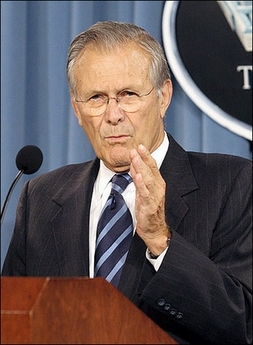BAGHDAD, Iraq - Bombs exploded on a soccer field Wednesday killing 11 young
people, and at least 42 other people, two of them Americans died elsewhere in
sectarian or political violence. Still, the president said plans are on track
for Iraqis to take over security.

US Defense Secretary
Donald Rumsfeld said sectarian violence has reached a high level in Iraq
but is not yet a "classic civil war."[AFP] |
The two homemade bombs went off on a soccer field in the mostly Shiite
district of Amil in west Baghdad, killing both players and spectators ranging in
age from 15 to 25, police 1st Lt. Maitham Abdul Razzaq said.
Two mortar shells struck another Shiite district, Abu Dshir, killing three
people under age 15, police Capt. Firas Queti said. One shell exploded on a
soccer field and the other hit a house, wounding a couple and their child, he
said.
Two Americans died in combat in Anbar province, the Sunni insurgent
stronghold west of Baghdad, the U.S. command said. One was a Marine assigned to
the Army's 1st Armored Division and the other was a soldier with the 9th Naval
Construction Regiment, the command said.
No group claimed responsibility for the Baghdad attacks, which appeared to be
part of the tit-for-tat attacks by Sunni and Shiite extremists. The attacks
threaten the unity government of Prime Minister Nouri al-Maliki, which took
office May 20.
The surge in sectarian violence has prompted the U.S. command to send at
least 3,700 American soldiers from the northern city of Mosul to reclaim the
capital's streets from Sunni insurgents, Shiite militias, rogue police,
criminals and freelance gunmen.
Despite the violence, President Jalal Talabani said the government remains
confident it can cope with the security crisis and vanquish extremist groups,
calling recent attacks "the last arrows in their quivers."
"We are highly optimistic that we will terminate terrorism this year,"
Talabani said. "The Iraqi forces will take over security in all Iraqi provinces
by the end of this year gradually, and if God's will, we will take the lead."
Talabani's prediction was far rosier than those from U.S. commanders and
Iraqi officials, and the president's staff quickly sought to explain that he was
referring to the beginning of a "process" for Iraqis to assume control, not the
final step.
The Iraqis have been given security responsibility in only one of 18
provinces - Muthanna. It is a remote southern province with an overwhelmingly
Shiite population and is among the most peaceful in the country.
"What he meant is that the process will be under way by the end of this
year," said Talabani's media adviser, Hiwa Osman. "We are not expecting a
complete hand-over by the end of this year - nobody really is."
Defense Secretary Donald H. Rumsfeld said he did not see Talibani's remarks
but hopes Iraqis will take over as conditions permit. "He's the president of
Iraq, and he can make his statements. And I didn't see the context of it or the
translation of it, and I can't comment beyond what our policy is."
Pentagon spokesman Bryan Whitman said there are "too many variables" to make
any kind of firm prediction about the hand-over of security.
"The Iraqi security forces are making great progress. Every week, every
month, they get more capable," Whitman said at the Pentagon.
In London, Britain's top military official said he expected British troops to
hand over control of the southern province of Basra to Iraqi security forces
early next year.
"We are now on a good path to hand over provincial control of Basra some time
in the first part of next year," Sir Jock Stirrup, chief of Britain's defense
staff, told British Broadcasting Corp. "But these are difficult issues we are
grappling with and I can't forecast what will happen over the next several
months."
British forces in the south have been cracking down on Shiite militias, which
infiltrated police ranks last year and wield considerable power in the city of
Basra, Iraq's second-largest.
U.S. officials have been pressing al-Maliki, a Shiite, to disband the Shiite
militias and make overtures to Sunni insurgent groups. However, the militias
draw strength from the disorder they help create because many Iraqis are losing
confidence in the police and army, preferring to rely on gunmen from their own
sect for protection.
The situation is worse in Baghdad and surrounding districts, home to more
than 20 percent of the country's 27 million people and a volatile mix of all of
Iraq's religious and ethnic groups.
One of the nation's most prominent Shiite leaders, Abdul-Aziz al-Hakim,
called Wednesday for establishing residential committees to help government
forces protect neighborhoods. He said the committees would work in coordination
with government forces to defend homes.
However, some critics fear such committees could become mini-militias, adding
more guns to an already violent society. Al-Hakim, head of the biggest Shiite
political party and former commander of the Badr militia, has been a longtime
critic of U.S. security strategy, maintaining the Americans should give more
responsibility to the Iraqis.
U.S. officials have said restoring security in Baghdad is essential if the
government is to survive, describing it as a "must-win" both for al-Maliki and
the extremists seeking to undermine his rule.
On Wednesday, police found 11 bodies, riddled with bullets and showing signs
of torture, in Suwayrah, 25 miles south of Baghdad, police Lt. Fikrat Mohammed
Hussein said. They appeared to be victims of sectarian death squads.
Iraqi security forces repulsed a series of attacks by insurgents on a police
base and seven highway checkpoints in the town of Madain outside Baghdad,
killing 15 gunmen, Hussein added.
Ten other people were killed or found dead Wednesday across Iraq, including
three laborers waiting on a roadside for jobs. They died when a bomb in a
garbage bag exploded, said police 1st Lt. Ahmed Mohammed Ali.